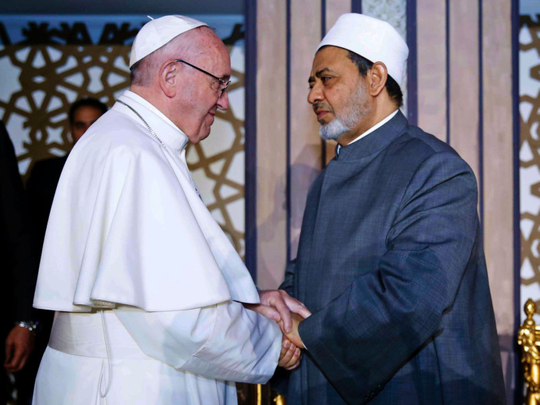
Communicating with the Vatican and other large religious institutions in the world is part of the continuous relationship between nations, said the London-based Pan-Arab paper Asharq Al Awsat. “This communication aims at organising relations and fighting hatred, not converting each party to the other’s religion. Religions of the world, like Islam, Christianity and Hinduism, need to organise the relations among their followers, as almost every country in the world has followers of those faiths. During these religiously tense times, it is within the best interest of the whole world that promoters of coexistence, not hate, prevail. We need those who call for tolerance, where there is tension. For instance, France is a Catholic majority country with a Muslim minority. The Pope is influential among his followers to put an end to national and religious extremism, which feeds on racism and political divisions.”
The meeting between Al Tayeb and Pope Francis, two of the world’s most prominent religious clerics, was a historic meeting in terms of timing, meaning and value, said the UAE’s Al Khaleej. “The speeches delivered by the imam and the Pope at the conclusion of the international Peace conference in the Al Azhar Al Sharif, emphasised the historic aspect of this meeting. The speeches opened new horizons for dialogue, cooperation and joint-action by all monotheistic religions against forces of darkness, evil and terrorism that are exercising their brutality in the name of religions. Al Tayeb called on restoring awareness about divine messages and correcting the image of wronged religions. This is a very important and urgent assignment for everyone who believes in their divine values, so that humanity can be rid of the destructive plague of terrorism that threatens it.”
The pope’s visit during these times and circumstances, and his meeting with Al Tayeb defines the tolerance and moderation of Islam, said Jordan’s Al Rai. “Pope Francis visited Egypt and held talks with Al Tayeb, who, with his moderate approach and depth of knowledge, is a representation for the true image and tolerance of Islam. This visit is evidence that there is a true understanding for events in the region, and that the terrorist attacks against Copts is not the religion of Islam targeting Christians, but rather a conspiracy. It also depicts an understanding that Daesh [the self-proclaimed Islamic State of Iraq and the Levant] ... has committed more crimes against Sunnis than they have against our Christian brothers.”
The message Pope Francis conveyed in addressing the ills of religious extremism and terror during his visit to Egypt resonated not only in the Arab world’s most populous country, but also in the rest of the world, said Lebanon’s Daily Star. “It was a ray of hope and a beacon of light that emphasised dialogue and connection as cornerstones of the road map towards a better and more peaceful world. His lofty words were echoed by none other than Al Tayeb, Egypt’s top imam and the head of the world’s primary seat of Sunni Islamic learning, Al Azhar, when he responded that the ground has been paved for monotheistic religions to play their role in realising equality, justice and human rights.”





_resources1_16a31069e4e_small.jpg)






